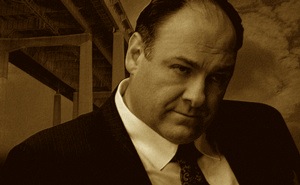
 GENERALLY DON’T ADVOCATE taking liturgical advice from TV shows, no less from a fictional character who is an amoral psychopath. However, this quote from “The Sopranos” rings true: “A wrong decision is better than indecision.”– Tony Soprano
GENERALLY DON’T ADVOCATE taking liturgical advice from TV shows, no less from a fictional character who is an amoral psychopath. However, this quote from “The Sopranos” rings true: “A wrong decision is better than indecision.”– Tony Soprano
I learned at a very young age that different people may react strongly and in polar opposite ways to the very same piece of music. You will receive credit and blame for the very same work. When I was twenty-one years old and still a student at the Berklee College of Music, I was directing music for the Sunday evening liturgy. All of the musicians and singers were talented Berklee students, and I encouraged them not to hold back. (I was also young and clueless.)
After mass a man approached me and said with a wide-eyed smile, “Thank GOD someone is doing what you are doing!” The feel-good vibes were short lived. Less than fifteen seconds later a young woman stormed up and asked one of the singers “WHO is in charge here?” Immediately, everyone pointed to me. No one wanted to touch this encounter with a ten-foot pole. “You RUINED my communion experience!!!” She continued to chew me out, repeating this phrase several times.
I don’t recall my exact response, but I do remember keeping calm, listening to her, and being unperturbed by the experience. I didn’t take her rant personally because I was mindful that I couldn’t control how other people react. I can only control my decisions. But I thought about my musical choices and learned from it. I was able to see both points of view which helped me make better decisions down the road. But more interestingly, it opened my eyes to a simple truth: people experience music differently. Therefore, you will never please everyone, nor should you. 
 ECENTLY, I CAME ACROSS yet anther nondescript poll about liturgical music. For the most part, it simply asked what kind of music people liked and how they felt about the state of music in the Church today. The article made no reference to liturgy documents or put forth any catechesis on the role of sacred music in the liturgy. It only addressed people’s personal preferences. The results of the poll, which expressed a wide spectrum of opinions on a wide range of musical styles hammered home the same message: It is impossible to please everyone.
ECENTLY, I CAME ACROSS yet anther nondescript poll about liturgical music. For the most part, it simply asked what kind of music people liked and how they felt about the state of music in the Church today. The article made no reference to liturgy documents or put forth any catechesis on the role of sacred music in the liturgy. It only addressed people’s personal preferences. The results of the poll, which expressed a wide spectrum of opinions on a wide range of musical styles hammered home the same message: It is impossible to please everyone.
Likewise, there may be factions or individuals within your community that are difficult to please. So what do we do?
Here is what not to do: Musicians and pastors (who can relate to this problem more than we’ll ever know) must avoid something I call “Reactionary Management.” Reactionary Management is when the tail wags the dog. Here’s how it works:
Someone complained! Oh, no! Therefore, change it!
No. Someone complained? OK. Step back and see if the complaint or aspects of the complaint are valid. Evaluate the complaint regardless of how it was delivered, charitably or otherwise. Then, make a decision, which may or may not please the person who complained. (In fact, it’s unlikely.)
 RULY, HERE IS WHAT WE MUST DO: Since it is impossible to please everyone, forget trying. (This can be liberating!) Instead, we must approach our decisions with doing what is right and just. Our responsibilities are to God, the liturgy, and the community as a whole. We have guidance from the Vatican II documents and the GIRM. Furthermore, the principles of Lex Orandi, Lex Credendi, and Lex Vivendi remind us if we believe what we pray, we must respond to God’s call by the way that we live. This is what is right and just.
RULY, HERE IS WHAT WE MUST DO: Since it is impossible to please everyone, forget trying. (This can be liberating!) Instead, we must approach our decisions with doing what is right and just. Our responsibilities are to God, the liturgy, and the community as a whole. We have guidance from the Vatican II documents and the GIRM. Furthermore, the principles of Lex Orandi, Lex Credendi, and Lex Vivendi remind us if we believe what we pray, we must respond to God’s call by the way that we live. This is what is right and just.
HERE ARE THREE SIGNS that you are on the right track:
1 • Doing what is right and just for the faithful will likely mean you are not making decisions based solely on your own personal preferences. In fact, you are probably not doing what you prefer most or much of the time.
2 • If you receive resistance, especially strong resistance, you are probably doing what is right and just. (There’s an old military saying: “If you are not catching flak, you are not over the target.”)
3 • If you are doing the hard work of long-term catechesis and resisting easy quick-fix solutions, you are probably doing what is right and just. 

 ACK TO TONY SOPRANO’S ADVICE — “A wrong decision is better than indecision.” I have discovered about human nature, that while many people are willing to voice very strong opinions (especially about music), very few are willing to take responsibility for implementing their vision. They may even give excellent advice worth listening to, but would rather that someone else take the heat if (when) there are complaints. Taking on this responsibility creates too much stress for some, often resulting in indecision (not to be confused with true discernment). Indecision based on avoidance of responsibility fosters dysfunction, decay, and abuse even in a religious environment.
ACK TO TONY SOPRANO’S ADVICE — “A wrong decision is better than indecision.” I have discovered about human nature, that while many people are willing to voice very strong opinions (especially about music), very few are willing to take responsibility for implementing their vision. They may even give excellent advice worth listening to, but would rather that someone else take the heat if (when) there are complaints. Taking on this responsibility creates too much stress for some, often resulting in indecision (not to be confused with true discernment). Indecision based on avoidance of responsibility fosters dysfunction, decay, and abuse even in a religious environment.
Rabbi Edwin H. Friedman writes in his book A Failure of Nerve (Leadership in the Age of the Quick Fix): “The conventional view of stress is that it has to do with overwork…Trying to be creative and imaginative is stressful, being responsible is stressful, being on the lookout for and trying to deal with sabotage is stressful.” (A Failure of Nerve, pg. 219-220) In other words, taking responsibility for doing what is right and just is stressful. Don’t envy a pastor’s or music director’s job!
Furthermore, no one likes a conductor or boss who blames others. If my tenors missed their entrance, maybe my cue wasn’t clear or I didn’t prepare them well enough. I have to look at that. Will this be perceived as weakness? No. It will earn respect and I’ll become a better conductor. Blaming others and unwillingness to take responsibility for problems or decisions are clear signs of poor leadership. If you see that, beware. 
In Summary:
• Do not make decisions based upon appeasing others. Try to do the right thing at the right time for the right reason.
• In doing so, don’t fear making mistakes or a wrong decision. Admit mistakes and build on them. Admitting a wrong decision may garner you more respect than trying to appear to be right all the time.
• Don’t fear adversity. It’s a sign you are on the right path. Adversity builds strength.
Finally, true service and leadership stem from a willingness to take responsibility. Pray for the strength and wisdom. The Holy Spirit will guide you.
